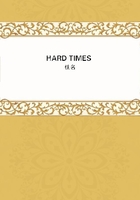
第55章 MEN AND MASTERS(2)
'Now, my friend,' said Mr. Bounderby, whom he could not have exasperated more, quite unconscious of it though he was, than by seeming to appeal to any one else, 'if you will favour me with your attention for half a minute, I should like to have a word or two with you. You said just now, that you had nothing to tell us about this business. You are quite sure of that before we go any further.'
'Sir, I am sure on 't.'
'Here's a gentleman from London present,' Mr. Bounderby made a backhanded point at Mr. James Harthouse with his thumb, 'a Parliament gentleman. I should like him to hear a short bit of dialogue between you and me, instead of taking the substance of it - for I know precious well, beforehand, what it will be; nobody knows better than I do, take notice! - instead of receiving it on trust from my mouth.'
Stephen bent his head to the gentleman from London, and showed a rather more troubled mind than usual. He turned his eyes involuntarily to his former refuge, but at a look from that quarter (expressive though instantaneous) he settled them on Mr.
Bounderby's face.
'Now, what do you complain of?' asked Mr. Bounderby.
'I ha' not coom here, sir,' Stephen reminded him, 'to complain. Icoom for that I were sent for.'
'What,' repeated Mr. Bounderby, folding his arms, 'do you people, in a general way, complain of?'
Stephen looked at him with some little irresolution for a moment, and then seemed to make up his mind.
'Sir, I were never good at showin o 't, though I ha had'n my share in feeling o 't. 'Deed we are in a muddle, sir. Look round town -so rich as 'tis - and see the numbers o' people as has been broughten into bein heer, fur to weave, an' to card, an' to piece out a livin', aw the same one way, somehows, 'twixt their cradles and their graves. Look how we live, an' wheer we live, an' in what numbers, an' by what chances, and wi' what sameness; and look how the mills is awlus a goin, and how they never works us no nigher to ony dis'ant object - ceptin awlus, Death. Look how you considers of us, and writes of us, and talks of us, and goes up wi' yor deputations to Secretaries o' State 'bout us, and how yo are awlus right, and how we are awlus wrong, and never had'n no reason in us sin ever we were born. Look how this ha growen an' growen, sir, bigger an' bigger, broader an' broader, harder an' harder, fro year to year, fro generation unto generation. Who can look on 't, sir, and fairly tell a man 'tis not a muddle?'
'Of course,' said Mr. Bounderby. 'Now perhaps you'll let the gentleman know, how you would set this muddle (as you're so fond of calling it) to rights.'
'I donno, sir. I canna be expecten to 't. 'Tis not me as should be looken to for that, sir. 'Tis them as is put ower me, and ower aw the rest of us. What do they tak upon themseln, sir, if not to do't?'
'I'll tell you something towards it, at any rate,' returned Mr.
Bounderby. 'We will make an example of half a dozen Slackbridges.
We'll indict the blackguards for felony, and get 'em shipped off to penal settlements.'
Stephen gravely shook his head.
'Don't tell me we won't, man,' said Mr. Bounderby, by this time blowing a hurricane, 'because we will, I tell you!'
'Sir,' returned Stephen, with the quiet confidence of absolute certainty, 'if yo was t' tak a hundred Slackbridges - aw as there is, and aw the number ten times towd - an' was t' sew 'em up in separate sacks, an' sink 'em in the deepest ocean as were made ere ever dry land coom to be, yo'd leave the muddle just wheer 'tis.
Mischeevous strangers!' said Stephen, with an anxious smile; 'when ha we not heern, I am sure, sin ever we can call to mind, o' th'
mischeevous strangers! 'Tis not by them the trouble's made, sir.